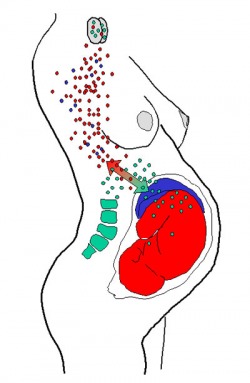Chimerism and Auto-Immune Diseases
Scleroderma
The auto-immune disease scleroderma has been linked to microchimerism, particularly fetal microchimerism, in several case studies. In the first case study, the DNA of women with scleroderma was tested and compared to women who did not have scleroderma. The results concluded that women with the auto-immune disease had large amounts of Y-chromosome specific sequences in their DNA, and the women without the auto-immune disease were absent of the Y-chromosome specific sequences in their DNA. The research was taken was step further and they tested the affected scleroderma tissue of women who had previously given birth to at least one male son. They compared these samples to samples of skin from unaffected women. Once again, the affected tissue contained large amounts of Y-chromosome specific sequences. Therefore, researchers are beginning to believe that microchimerism may play a role in this auto-immune disease, but more research will need to be done to confirm this assumptions.
Thyroid Disease

A similar experiment was done with women who had thyroid disease. They compared women with thyroid disease to normal women, and found the women with thyroid disease had large amounts of fetal cells residing in their thyroid. In the diagram to the left, the exchange between maternal and fetal cells can be seen. It is visible how the fetal cells spread throughout the mother's body. The diagram illustrates the fetal cells residing in the thyroid as well. In theory, researchers believe that initially all women have a certain amount of fetal cells within their body, but that these fetal cells should decrease dramatically after the immune privilege pregnancy status (period of time that prevents the mother's body from attacking the fetus) is complete. Therefore, fetal cells that do not decrease during that status initiate a postpartum maternal immune response. The mother's body then begins to attack the area where the fetal cells are found, which happens to be the thyroid, resulting in thyroid disease.
